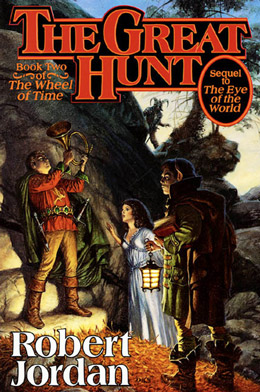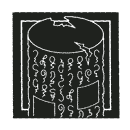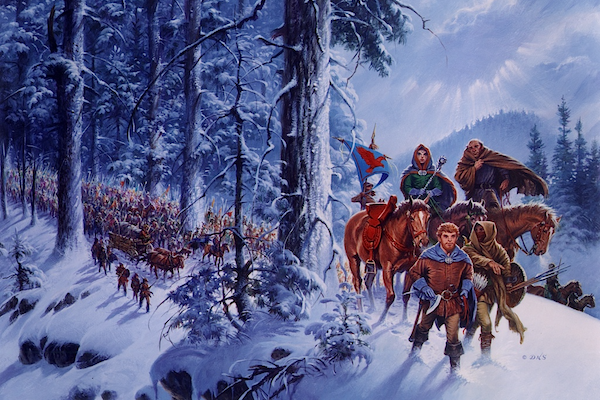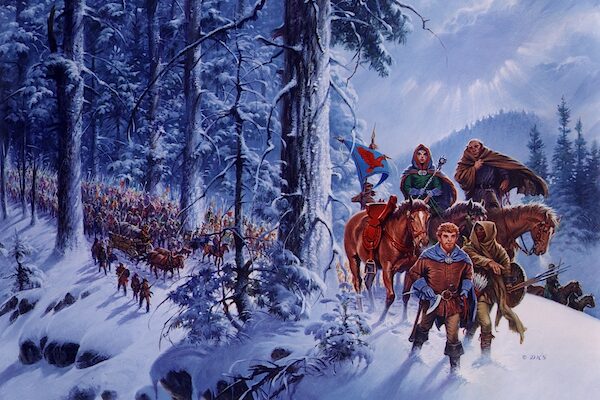A long, long time ago—or in the distant future—there was a version of the world in which there was a Wheel of Time Reread Redux! OR WAS THERE.
Today’s Redux post will cover Chapters 37 and 38 of The Great Hunt, originally reread in this post.
All original posts are listed in The Wheel of Time Reread Index here, and all Redux posts will also be archived there as well. (The Wheel of Time Master Index, as always, is here, which has links to news, reviews, interviews, and all manner of information about the Wheel of Time in general on Tor.com.)
The Wheel of Time Reread is also available as an e-book series! Yay!
All Reread Redux posts will contain spoilers for the entire Wheel of Time series, so if you haven’t read, read at your own risk.
And now, the post!
Chapter 37: What Might Be
He was a soldier. He was a shepherd. He was a beggar, and a king. He was farmer, gleeman, sailor, carpenter. He was born, lived, and died an Aiel. He died mad, he died rotting, he died of sickness, accident, age. He was executed, and multitudes cheered his death. He proclaimed himself the Dragon Reborn and flung his banner across the sky; he ran from the Power and hid; he lived and died never knowing. He held off the madness and the sickness for years; he succumbed between two winters. Sometimes Moiraine came and took him away from the Two Rivers, alone or with those of his friends who had survived Winternight; sometimes she did not. Sometimes other Aes Sedai came for him. Sometimes the Red Ajah. Egwene married him; Egwene, stern-faced in the stole of the Amyrlin Seat, led the Aes Sedai who gentled him; Egwene, with tears in her eyes, plunged a dagger into his heart, and he thanked her as he died. He loved other women, married other women. Elayne, and Min, and a fair-haired farmer’s daughter met on the road to Caemlyn, and women he had never seen before he lived those lives. A hundred lives. More. So many he could not count them. And at the end of every life, as he lay dying, as he drew his final breath, a voice whispered in his ear, I have won again, Lews Therin.
Flicker flicker flicker flicker flicker flicker flicker flicker flicker flicker flicker flicker flicker flicker flicker flicker flicker flicker flicker flicker flicker flicker flicker flicker flicker flicker.
I do not think you can be any kind of consumer of science fiction or fantasy without being at least peripherally aware of the concept of the multiverse: the idea that there are an infinite number of versions of what we think of as the “real” world, where different choices and different outcomes of happenstance occurrences led to different outcomes from our own version, and that these differences can range from the miniscule to the vast. And furthermore, that these different versions all exist independently of one another, both spatially and temporally.
There is, as I understand it, quite a lot of controversy over whether the “many-worlds” theory has any validity from a scientific standpoint, but for my part, I am firmly in the contingent of artists and writers who are far less concerned with scientific rigor, and far more in favor of seizing upon such a insanely juicy story idea with delirious glee and running and far and fast with it as is humanly possible. Because oh my God how is that not the coolest concept EVER, who even cares whether it is a real thing or not?
Granted, Robert Jordan was probably a tad more concerned with scientific rigor than I am, considering that he had a degree in physics and I, well, don’t, but nevertheless I am firmly seating him in the “artistic delirious glee” category when it comes to this particular concept, because really there’s no other way to explain how he took the idea and employed it to such effect in the first few WOT books (and this chapter in particular).
…Even if he then seemed to sort of abandon it thereafter. The whole Portal Stone thing in general gets more or less laid by the wayside after TSR, in fact, something which I’m pretty sure I’ve commented on before.
Though not in this particular commentary. I had totally forgotten that I talked about Hurricane Camille, my own family’s little Might Have Been moment (or, rather, Thankfully Never Was moment). But yeah, it is still freaky to consider that somewhere there may be a version of the world in which a failure to listen to the radio led to me never being born. Yeek.
Anyway. Like most authors who play with the multiverse concept, though, Jordan still introduces a constant: the now-infamous (among WOT fans, anyway) refrain I have won again, Lews Therin. Not the most cheery of constants, is it?
So I guess it’s a good thing we’re sticking with the one (?) version of Rand’s life where the Dark One (or it is Ishy?) doesn’t get to snottily whisper “neener” in his ear at the end of it. At least, so I assume, all things considered. Yay!
I know I remember, though, lots of fan discussion back in the day about how (or whether) the multiverse idea squares with the notion of circular time, leading to some rather spectacularly esoteric philosophical debates. Because why would there be multiple simultaneously co-existing alternate versions of the world, when the “Seven Ages in a Wheel formation” idea basically constitutes sequential alternate versions of the world, one after the other? Wouldn’t a multiverse suggest that there is not one “Wheel of Time”, but an infinite number of Wheels, all spinning independently of each other? And if Rand only definitively wins against the Dark One in one version, why doesn’t his loss in all the others break all the Wheels?
You know, stuff like that. DISCUSS.
Well, regardless of whether the multiverse thing makes sense in the context of WOT, it remains an extremely badass idea that utterly enthralled me on first reading and makes me nod and say “Yep, still cool” now.
Rand went to his friends. When he tried to straighten Mat, Mat jerked and stared at him, then grabbed Rand’s coat with both hands. “Rand, I’d never tell anyone about—about you. I wouldn’t betray you. You have to believe that!” He looked worse than ever, but Rand thought it was mostly fright.
“I do,” Rand said. He wondered what lives Mat had lived, and what he had done. He must have told someone, or he wouldn’t be so anxious about it. He could not hold it against him. Those had been other Mats, not this one.
Hahaha, wow, I forgot about this part as well, which maaaybe puts a little bit paid to my commentary a couple of posts ago about how the “Mat betrays Rand” thing was a shoe that never got dropped. Because I guess it did get dropped—just not in this version of the story. Sneaky. Very sneaky, Jordan!
Chapter 38: Practice
I remember being really rather upset at the amount of time Rand and Co. lost during their disastrous “journey” to Toman Head in the last chapter, but I recognize now that it happened pretty much for the sole reason that the Supergirls could spend that time getting at least that much actual training in their powers before being flung out into the business of helping save the world.
So, okay, but that does make this bit interesting:
The golden-haired Daughter-Heir of Andor pushed the door shut and hung up her cloak on a peg. “I just heard,” she said. “The rumors are true. King Galldrian is dead. That makes it a war of succession.”
Interesting, because it implies that Galldrian’s death just happened. Which means it took Thom months from when Dena was murdered to actually accomplish his revenge.
Which I think makes the whole thing more plausible, in retrospect. Since I think it was stretching it a little to assume that a gleeman, even one as badass as Thom, could just waltz right up to the king of Cairhien and stick a knife in him within 24 hours of deciding to do it. Of course, it also makes it much more cold-blooded and premeditated an act, but, well.
Suddenly [Egwene] giggled. “He is good-looking, isn’t he? Even when he walks he looks as if he’s dancing.” The color in her cheeks deepened. “I know I shouldn’t stare at him, but I can’t help myself.”
“I can’t either,” Min said, “and I can see what he is like.”
“But if he is good—?”
“Egwene, Galad is so good he’d make you tear your hair out. He’d hurt a person because he had to serve a greater good. He wouldn’t even notice who was hurt, because he’d be so intent on the other, but if he did, he would expect them to understand and think it was all well and right.”
Maybe it’s just because I can’t actually see Galad in all his purported hotness, but I constantly have trouble picturing him being as good-looking as the characters all insist he is, because his personality is so incredibly unattractive to me that I don’t conceive of him being physically beautiful. Which is a fairly disturbing mental fail on my part, since intellectually I think the ubiquitousness of the Beauty Equals Goodness trope is both toxic and damaging, but apparently viscerally I am just as susceptible to it as anyone. Not a very comforting thought.
(I suppose it is also interesting that I so automatically classify Galad’s “goodness” as, well, badness, but that’s a discussion for another post.)
Apparently Min had not dropped her voice enough, for there was a growl from Nynaeve. Suddenly the door whipped open once more, and a gale howled into the room. It did not ruffle the blankets on Egwene’s bed, but Min and the stool toppled, to roll against the wall. Immediately the wind died, and Nynaeve stood with a stricken look on her face.
This is laughably minor, but I mention it because I am just not sure how I’ve continually managed to miss till now that Nynaeve actually knocked Min down with her little burst of wind temper here, and that’s why she was so apologetic. I remember being puzzled before about why she was so contrite just for blowing the door open! Wow, Leigh. The hazards of being a speed-reader, I guess.
As for Liandrin: *kchack* *BLAM*
Pfeh.
Elayne said, “I am going, too.”
“Elayne,” Nynaeve said gently, “Egwene and I are the boys’ kith from Emond’s Field. You are the Daughter-Heir of Andor. If you disappear from the White Tower, why, it—it could start a war.”
“Mother wouldn’t start a war with Tar Valon if they dried and salted me, which they may be trying to do. If you three can go off and have an adventure, you needn’t think I am going to stay here and wash dishes, and scrub floors, and have some Accepted berating me because I didn’t make the fire the exact shade of blue she wanted. Gawyn will die from envy when he finds out.”
They really are all astoundingly naïve at this point, aren’t they. I mean, Elayne is possibly the most so, what with the not understanding how much “adventures” tend to thoroughly suck when you’re actually living them, but all of them show exactly how green they are by how completely they fail to notice the giant flashing neon sign over Liandrin’s head saying THIS IS A TRAP. Even Min, whose job is literally to see giant flashing signs over people’s heads (maybe not in neon, but whatever), manages to miss it.
Well. They’ll get schooled on that score real soon now, won’t they. Ugh.
And that’s our show for now! Have a week, and come on back next Tuesday!














